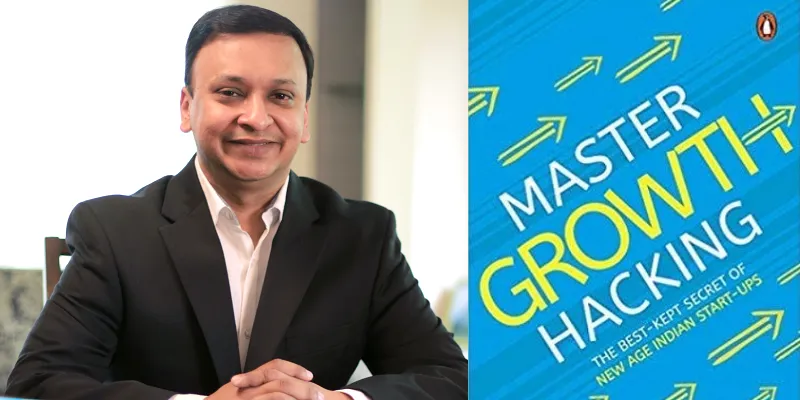Create a marketing team with T-shaped skills: startup scaling tips from Apurva Chamaria, co-author, ‘Master Growth Hacking’
Apurva joins us in this chat on challenges facing scale-stage startups, how growth hacking can help, cultural foundations of growth, and emerging trends in this space.

Apurva Chamaria is the co-author of Master Growth Hacking: The Best-Kept Secret of New-Age Indian Startups (see my book review here). He is the Chief Revenue Officer at RateGain, and was previously Head of Corporate Marketing at HCL Technologies. He graduated from Harvard Business School, International Management Institute (New Delhi), Indian Institute of Mass Communication (New Delhi) and Mayo College (Ajmer).
In an interaction with YourStory, Apurva covers a range of topics about starting up including growth hacking, and provides great scaling tips.
Edited excerpts:
YourStory: In the time since your book was published, what are some notable new examples of growth hacking you have come across?
Apurva Chamaria: There are many fast growing Indian startups like Shopclues, Zomato, IndiaMart that have successfully leveraged growth hacking techniques. There are quite a few significant hacks that were implemented by Shopclues to pull more users to its platform and convert them into transacting customers.
As we see, Zomato operates in over 10,000 cities across 24 countries, but it has always been a very limited-cost marketing company. Zomato has never done TV or outdoors in a big way, other than a small outdoor campaign recently where it used quirky messages targeting millennials. It focuses a lot on near-zero-cost marketing such as deploying below the line (BTL) materials like stickers and tent cards in restaurants, building strong online communities, and organic social media.
Increasingly, as most of growth funding goes to a limited number of internet players, I am seeing more and more challengers adapting growth hacking techniques to grow frugally.
YS: How was your book received? What were some of the unusual responses and reactions you got?
AC: Master Growth Hacking published by Penguin Random House is doing very well. It is heartening to see that many startup founders, seasoned marketers and entrepreneurs have been reaching out to me saying the book has been very useful in helping them think about new ways to scale their businesses and re-imagine their go-to-market efforts.
The most unusual response I got was being recognised by a reader in Jaipur. In my view, in India that usually only happens to the authors of popular fiction and I was surprised that not only had that person read my book but he was also aware of many of my online articles and blogs, and recognised me. He had also been following me on social media for the last seven to eight years.
YS: What are the typical challenges entrepreneurs face as they scale up their company from startup to enterprise? How can these challenges be addressed?
AC: Every startup entrepreneur wants the brand to stand out and be the best. Before building a brand scale up strategy, one should identify factors that can positively impact the brand as a whole when appropriately applied.
Here are some of the common challenges that the majority of the entrepreneurs face while building and scaling a successful and well-known brand:
- Poor product-market fit: No amount of great marketing can help a poor product succeed. In fact, good marketing often kills a bad product faster.
- Lack of personal branding: When the company is small, the founder often has to use his or her personal brand to generate traction. Founders miss out on creating a personal brand as they are completely preoccupied with the operational nitty-gritty of their business, and this hurts the business.
- Bad design: Often, founders under-invest in product and service design, which hampers exponential growth. One of the best ways to growth hack is by becoming a design-led business.
- Unskilled team: Growth hacking needs a heterogeneous team of curious marketers. Most firms are guilty of hiring similar talent across the marketing team instead of creating a team of T-shaped marketers with varied skills and interest that leads to breakthrough growth hacks.
- Under-utilisation of digital marketing: Due to a lack of understanding, traditional marketers under-index effort and spends on digital marketing, thereby missing out on growth hacks.
These challenges can be addressed by having an open mind to learn new skills, focusing on hiring and creating an excellent growth hacking team, and networking to unlock synergies in the ecosystem.
YS: How should innovators strike that delicate balance between ‘stick to your vision’ and ‘adapt to a changed world’?
AC: Entrepreneurship involves more than just a great idea. So as an entrepreneur, one should have diligence as well as flexibility to keep up with ever-changing parts of a business that need to be managed. Running a business in any environment is difficult enough, but when things change as fast and fundamentally as they do in the modern world, entrepreneurs need to keep themselves aligned to the changing scenario.
While the entrepreneurs can stick to their vision, they do need to constantly adjust the path to achieve the vision. Perhaps, the biggest skill entrepreneurs need to practice is to learn, unlearn and relearn, or else they will find it hard to sustain the business.
YS: What are the toughest challenges in keeping alive the growth hacking culture? How can these challenges be overcome?
AC: A company’s culture will always be the root for growth, momentum and innovation. To cultivate a strong culture, one has to create a strong team, empower the individuals to apply their passions to a communal vision, and encourage open transparency.
The company should always feel that they are nurturing a work culture in which they can communicate, collaborate and thrive together. To build this kind of environment, it requires serious, substantial culture development. But there are also some techniques, if applied, that can overcome existing challenges.
From the initial stage itself, one should base the company’s culture in a traditional way for the underpinnings to scale accordingly. Furthermore, rooting that tradition in teams will ensure scalability. Culture is magnetic. It has the ability to pull impeccable people into seamless collaborations.
Anytime when the business grows, it is important to figure out what attracts and what opposes. This can minimise any possible growing pains. Encourage the team of culture caretakers to communicate, educate and demonstrate the cultural ideals of your company.
To develop a growth hacking culture, the company has to institutionalise values of ownership, frugality and innovation, and create programmes and processes that reward these values. While hiring, care has to be taken to hire people who exhibit these values.
The toughest challenge to keep the culture alive is not enough awareness about the culture amongst the leaders themselves, and not enough demonstration of the culture by them. These challenges can be overcome by sharply defining the culture, communicating it, and rewarding behaviour that reinforces the culture.
YS: How are concerns over data privacy (eg. GDPR) affecting growth hacking?
AC: World over, consumers are becoming very careful and sensitive about the way companies are using their personal data, and it is the job of any entrepreneur to keep in mind emerging norms like GDPR to ensure the customers trust is not violated.
Companies like Facebook that have erred in the past have often faced consumer backlash. Growth hacking does not mean one can violate the laws of the land.
YS: What do you see as the top three emerging trends in the field of growth hacking?
AC: I see the following trends emerging when it comes to growth hacking:
- Value to the end consumer: What will someone gain by sharing your content with their friends and families? This is a question that you must ask before creating any social media content. Simply providing information on your products and services will not lead you anywhere. You must ensure that by sharing your content, the audience will perceive you as thought leaders or experts in their areas of interest. You can do so by making your content unique and value-centric. Practical and insightful articles are a sure-shot way to get attention.
- Influencer marketing: Figure out the key people in your community who have a huge fan following. Make sure that these people engage with your content to expand its reach and add credibility. Dark tweets, DMs and hashtags are a few social media tactics that can get your content the eyeballs. Do thorough research on the identified influencers and see what kind of content they normally share or engage with. Align your content strategy accordingly.
- Be part of the conversations: Often, marketers tend to loosen the grip once the post is out. They tend to ignore the engagement happening around their content, which is the biggest mistake one can make. You must constantly encourage engagement from your target audience by remaining responsive to every comment and every like you receive on your post. That will encourage your audience to continue interacting with your content.
YS: What are some good examples you have seen of growth hacking by the social sector or NGOs?
AC: According to me, the ALS Ice Bucket Challenge is the perfect example of growth hacking that even became a viral internet sensation in the social sector. It generated more than $100 million in donations in a single month, a staggering amount considering the organisation took in only $2.5 million in the previous year.
YS: What are some good websites or blogs about growth hacking that you would recommend to startups?
AC: Some of the good websites and blogs on growth hacking that I follow are by Avinash Kaushik (author of Web Analytics), Neil Patel (co-author of Hustle), Nir Eyal (author of Hooked), Noah Kagan, Casey Winters, Anum Hussain, Brian Balfour, Sylvia Ng, Andrew Chen, and KissMetrics.
YS: What new projects or initiatives are you working on now? What is your next book going to be about?
AC: I am currently focused on scaling Rate Gain, where I am the Chief Revenue Officer, and using some of what I have learnt to grow the business.
I am always available to help founders figure out ways to scale their business. It is an unpaid service I offer from my end and it is my way of giving back to the society.
I do not have plans to write any book as of now. Writing any well-researched book takes two to three years, and is very time consuming and exhausting. I am taking a break from writing for the next couple of years.
YS: What is your parting message to the startups and aspiring entrepreneurs in our audience?
AC: My message to aspiring entrepreneurs and founders is to have humility as you go around building your business, and have conviction in your ideas. You will go through tough times and it is this humility and conviction that will help you to finally win the battle.
Lastly, the only risk you face is not taking a risk, so take confident risks and experiment as you grow your business.







